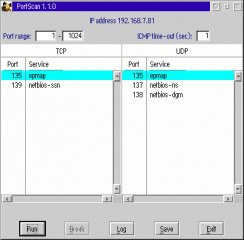PortScan scans TCP and UDP ports of IP nodes. Program can be used as separate tool and can be called by LanScan.
PortScan
Version:
1.2.0
Release date:
Sunday, 1 February, 2004
Categories:
Interface:
- PMShell
Following ones are the download links for manual installation:
| PortScan v. 1.2.0 (source included, 1/2/2004) | Readme/What's new |
Description:
------------
PortScan program is the tool for scanning TCP and UDP ports of IP node.
There are two versions of program:
- PortScn4.exe for TCP/IP 4.0 and
- PortScan.exe for TCP/IP 4.1 and above.
Installation:
-------------
Put file PortScan.exe (or PortScn4.exe) into any directory (it is preferably
into the same directory, as LanScan).
Syntax:
-------
PortScan <IP address> [<start port> [<end port> [<ICMP time-out>]]]
or
PortScn4 <IP address> [<start port> [<end port> [<ICMP time-out>]]]
Here:
<IP address> - IP address for scanning;
<start port> - the first port for scanning;
<stop port> - the last port for scanning;
<ICMP time-out> - program will wait for the receiving of ICMP package
during <ICMP time-out> seconds.
PortScan obtains values for parameters
<start port>, <end port> and <ICMP time-out> using:
1. Global parameters from PORTSCAN.INI;
2. Special parameters (parameters for specified IP-address only)
from PORTSCAN.INI;
3. Program parameters field.
Parameters from each next source overwrites parameters from previous source.
Program checks parameters and, if they are incorrect, uses
4. Default values.
Buttons description:
--------------------
Run - start the scanning.
Break - stop the scanning.
Log - save the scanning results into file PortScan.Log.
Save - put parameters <start port>, <end port> and <ICMP time-out>
into file PORTSCAN.INI.
Exit - quit the program. |
 en.ecomstation.ru/projects/lanscan/PrtSn120.zip en.ecomstation.ru/projects/lanscan/PrtSn120.zip |
Record updated last time on: 06/12/2020 - 13:38

This work is licensed under a Creative Commons Attribution 4.0 International License.

Add new comment